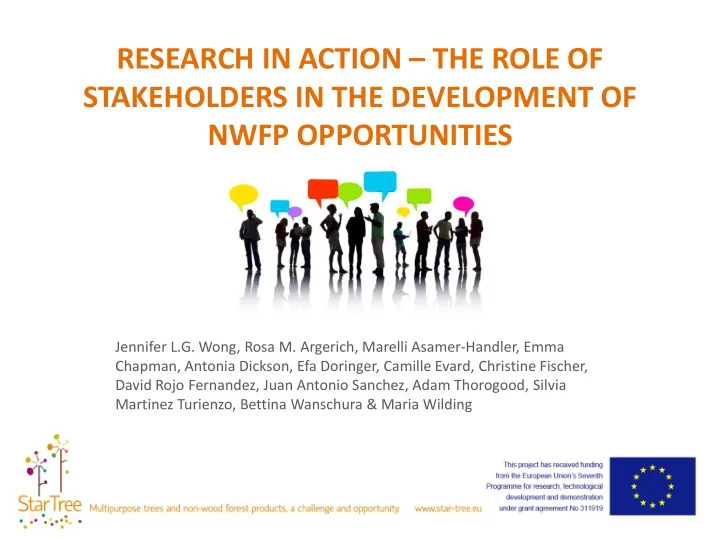

RESEARCH IN ACTION – THE ROLE OF STAKEHOLDERS IN THE DEVELOPMENT OF NWFP OPPORTUNITIES Jennifer L.G. Wong, Rosa M. Argerich, Marelli Asamer-Handler, Emma Chapman, Antonia Dickson, Efa Doringer, Camille Evard, Christine Fischer, David Rojo Fernandez, Juan Antonio Sanchez, Adam Thorogood, Silvia Martinez Turienzo, Bettina Wanschura & Maria Wilding
“action without theory is blind, just as theory without action is meaningless” Action Research used to explore what we could learn about NWFP enterprise development from practitioners working on real world problems AR depends on participatory action in a cycle of planning, action and reflection. This presentation focussed on what we learnt about facilitation of stakeholder engagement and management of AR
Stages of Action research Phase Action research Design research 1 Diagnosis – identify your Present ideas to target users on StarTree problem design reflective cycle 2 Action planning – consider Specify design utilising inputs alternative courses of action from users and practical research and decide what to do Classic AR 3 Take action – do what you Produce product cycle planned! 4 Evaluation – examine the Evaluation – test product with consequences of action users 5 Specify learning – identification of general findings
Austria – new products and producers for Nature Park speciality label Telephone survey of 70 Baseline people in 48 Nature Parks Almenland – planting of fruit trees 2 awareness events Kaunergrat – gourmet products The negotiation of activities of mutual interest is a natural consequence of the AR process and provides opportunities to enhance delivery of chosen ideas but also Südsteiermark – business planning for at times necessitates dropping some ideas marketing networks – for example the idea for educational events for producers was not picked up with any of the three Nature Parks.
Castilla y León – mushroom identification Tabuyo del Monte 16 Surveys/ focus groups MYKO- • Forest owners Funghi • MICOCYL Processors • StarTree Mushroom hunters • Rural inhabitants Including a wide variety of stakeholders in design and content of app meant grappling with issues related to needs of different: • Types of users (recreational, commercial, scientific) • Origin of pickers (local, regional/linked and foreign)
Catalonia – mushroom business development SWOT - Mushroom research + business support SWOT – Black truffle SMEs Black truffle strategic plan Meetings 2 x farmers ? Action plan 2 x truffle hunters questionnaire 2 x seedling nurseries 4 x processors
Scotland – building on existing labelling initiatives The flexibility of AR means you are more likely to get results, more likely to be putting the available resources into something worthwhile.
Wales – product innovation Discussions with LlyG members Training in beekeeping WFP inventory and assessment Non-edible mushroom products Open call for SME R&D projects Bluebell potting medium Participants valued the flexibility of the approach – broad aims agreed at the outset but potential to change direction and respond to challenges following interim results and feedback. However, building in flexibility and ensuring each project is tailored to an individual group or set of circumstances takes more time to set up and administer throughout the process.
Pathways for stakeholder interaction Reflective feedback Going forward Positive outcome Indifference Negative outcome
Key findings • Motivation is key to the success of innovation and can only be triggered by the stakeholders • The change of perspective that is linked with an AR approach can produce a new insight or course of action • The consultation process led to an increase in stakeholder confidence and networking opportunities • Small cash funding targeted on stakeholder priorities can be very effective it is not the business plans or activities which can be transferred to other regions but the process of listening and being reactive to the group dynamic and to foster ideas even if they are not quite what was first envisaged
Recommendations • AR is a useful component of research projects with rural development objectives - as a reality check and to create networks for dissemination and adoption of project results • Rural development support programmes would benefit from adoption of participatory processes. This will require investment in skilled facilitation alongside financial assistance.
Recommend
More recommend